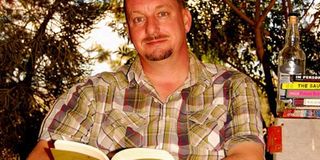My first real love was poetry, then I fell in love with Kenya

Stephen Derwent Partington. PHOTO | COURTESY
What you need to know:
My love for reading was inspired by three people. Dad and two teachers; Ms Bower, (a short-term teacher who taught at my secondary school) and Ms Parker, an elderly woman who was obsessed with William Golding’s writing.
Because I like to giggle, I’ve never lost my love of an old, hilarious novel I read in my teens: ‘And to my Nephew Albert I Leave the Island What I Won Off Fatty Hagan in a Poker Game’ – brilliant.
As for poetry, I started reading and enjoying it at a young age. My dad was no great fan of poetry; however, he did have a decent-sized collection of poetry books especially the Romantic Period poets.
My earliest memories of books are of being read to by my father. He read me The Hobbit every day. I immensely enjoyed both the story and when dad paused to say: “This is terribly written.”
I enjoyed fantasy books, too. My favourite primary schooldays read was a short novel called The Black Cauldron. There were also a set of ‘interactive’, play-it-yourself books by Steve Jackson and Ian Livingstone, which had odd titles such as Citadel of Chaos.
My love for reading was inspired by three people. Dad and two teachers; Ms Bower, (a short-term teacher who taught at my secondary school) and Ms Parker, an elderly woman who was obsessed with William Golding’s writing.
Because I like to giggle, I’ve never lost my love of an old, hilarious novel I read in my teens: ‘And to my Nephew Albert I Leave the Island What I Won Off Fatty Hagan in a Poker Game’ – brilliant.
As for poetry, I started reading and enjoying it at a young age. My dad was no great fan of poetry; however, he did have a decent-sized collection of poetry books especially the Romantic Period poets.
So, I got to read and like the Conversational Poems of Samuel Taylor Coleridge, the writer who I later based my doctoral study on. I was also inspired in the class of a Mr Kent who taught us First World War Poetry in upper primary. I really enjoyed the class and learnt that poetry must at least try to engage with the world.
Nonetheless, my reading was a relatively private thing, when growing up. My friends were not ‘bookies’ and my village didn’t have a ‘reading culture’, as such.
The Wind Eye by Robert Westall
This was my favourite read in secondary school. It is a story about a family holidaying on the north of England; the children in the story find an old boat which they repair and it takes them back in time.
The boat turns out to be a Viking boat which time travels!They then confront the legendary power of St Cuthbert and the whole family learns some profound lessons on life.
Hawksmoor by Peter Ackroyd
Perhaps as a hangover from my love of The Wind Eye, above, this favourite adult read had a similar ‘back and forth’ in time feel. It tells the parallel stories of two men.
One, an architect, builds churches for which he needs human sacrifices and the other, a detective who investigates murders committed in the same churches. I read Hawksmoor while studying at Oxford; it was a sort of ‘light relief’ read in between heavy academic texts.
Political Shakespeare
I encountered this book as an undergraduate; it’s probably the single book that encouraged me to continue with my academic studies, rather than enter a different career — I had seriously considered the diplomatic corps, earlier. It is a collection of essays by various hands that apply left-wing ‘cultural materialist’ theory to Shakespeare texts.
This collection reminds us that the best way to read, is actively and responsibly, never fully accepting the ‘voice and intention’ of the author.
Kwani?
When I first arrived in Kenya, I came to love the political responsibility of the literature, but it was only when Kwani?came out in my second year here that I really noticed how writers can themselves remain socially aware, yet go far beyond the narrow ‘rules’ laid down by university -types. Kwani? was and is a great read.
Favourite Poems
I like Alice Oswald’s ‘Pruning in Frost’. No other poem I know of better catches the feeling of trying to carry out anything fiddly during the cold of frost and snow in the UK. Having grown up in the UK, perhaps I still cling to this poem, because it carries me back from time to time, say when I’m sitting on a roastingly-hot verandah here in Kenya.
‘Pruning in Frost’ also takes a particular moment, an event, and shares it with the reader in ways beyond the ordinary.
There’s no, ‘It was cold and dead and there was no wind’, instead, there’s ‘All life’s ribbon frozen mid-fling,’ this line does everything so wonderfully. Other favourite poems are Samuel Taylor Coleridge’s ‘Frost at Midnight’, and ‘This Lime Tree Bower, My Prison.’
As told to GLORIA MWANIGA MINAGE
Stephen Derwent Partington is a teacher and literary critic who has married into Kenya. He writes a regular literary article for the Saturday Standard, has a light topical poem in the weekly East African, and pens a satirical piece each week for the Kenyan tabloid, The Nairobian.
He also writes the occasional academic article, has had poems published in numerous ‘little magazines’, and has produced two full-length poetry collections: SMS & Face to Face (Kenya, Phoenix) and How to Euthanise a Cactus (UK, Cinnamon).
He is currently co-editing a ground-breaking collection of Kenyan poetry since 2003. At university, he won numerous academic and poetry prizes




